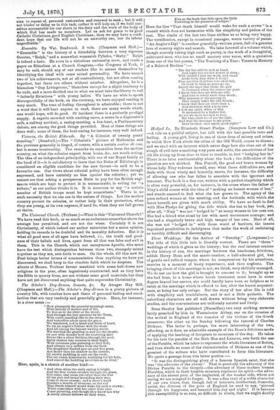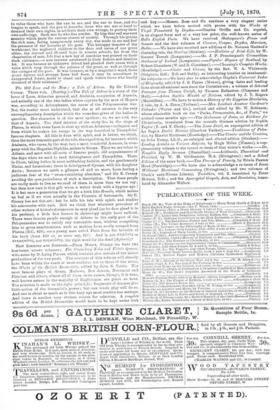Three Weddings.' By the Author of "Dorothy." (Longmans.)— The title
of this little tale is literally correct. There are "three" weddings of which it gives us the history ; but the real interest centres in the history of one, the marriage between the handsome, frivolous, selfish Harry Dean and the music-teacher, a half-educated girl, but of gentle and refined temper, whom he compromises by his attentions, marries in a moment of hasty repentance, and then neglects. The bringing about of this marriage is not, we think, very skilfully managed. We do not see how the girl is brought to consent to it; brought up as she had been, in a home where harsh treatment must have in some degree braced her nerves, she could hardly have been so helpless as to catch at the marriage which is offered to her, after the barest acquaint- ance, as being her only refuge. But the story of her after life is told with simplicity and truthfulness, and is not a little pathetic. The subsidiary characters are all well drawn without being very elaborate studies, and the conversations are uniformly natural and lively.
Dean Stanley has published (Macmillan) two very striking sermons lately preached by him in Westminster Abbey, one on the occasion of the arrival in England of the remains of the victims of the Greek massacre; the other on the Sunday following the funeral of Charles Dickens. The latter is, perhaps, the more interesting of the two, affording, as it does, an admirable example of the Doan's felicitous mode of applying the teaching of Scripture to occasions of the day. He takes for his text the parable of the Rich Man and Lazarus, sets forth the use of the Parable, which he takes to represent the whole literature of fiction, and then dwells on some of the characteristics of Dickens as one of the greatest of the writers who have contributed to form this literature. We quote a passage from this latter portion :- "It was the distinguishing glory of a famous Spanish saint, that she was 'the advocate of the absent.' That is precisely the advocacy of the Divine Parable in the Gospels—the advocacy of these modern human Parables, which in their humble measure represent its spirit—the advo- cacy of the absent poor, of the neglected, of the weaker side, whom not seeing we are tempted to forget. It was a fine trait of a noble character of our own times, that, though full of interests, intellectual, domestic, social, the distress of the poor of England, he used to say, 'pierced through his happiness, and haunted him day and night.' It is because this susceptibility is so rare, so difficult to attain, that we ought doubly
to value those who have the eye to see, and the ear to hear, and the tongue to speak, and the pen to describe, those who are not at hand to demand their own rights, to set forth their own wrongs, to portray their own sufferings. Such was be who lies yonder. By him that veil was rent asunder which parts the various classes of society. Through his genius the rich man, faring sumptuously every day, was made to see and feel the presence of the Lazarus at his gate. The unhappy inmates of the workhouse, the neglected children in the dens and caves of our great cities, the starved and ill-used boys in remote schools, far from the observation of men, felt that a new ray of sunshine was poured on their dark existence,—a new interest awakened in their forlorn and desolate lot. It was because an unknown friend had pleaded their cause with a -voice which rang through the palaces of the groat, as well as through tho cottages of the poor. It was because, as by a magician's wand, those gaunt figures and strange faces had been, it may be sometimes in exaggerated forms, made to stand and speak before those who hardly dreamed of their existence."































 Previous page
Previous page